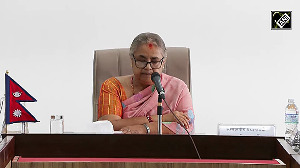The worldwide protests against China ignited by the Olympic torch has landed United States president George W Bush's proposed trip to attend the Beijing Games opening into a hot political controversy and made it a major campaign issue for the candidates seeking to succeed him.
Democrat presidential hopeful Barack Obama on Thursday joined rival Hillary Clinton in calling Bush to boycott the opening event over China's human rights record, especially the recent crackdown in Tibet.
Bush, on his part, has asked China to 'begin a dialogue' with representatives of the Dalai Lama to resolve the Tibet issue.
"We both agree that it would stand the Chinese government in good stead if they would begin a dialogue with the representatives of the Dalai Lama," Bush said as he met Singapore's senior minister Goh Chok Tong on Wednesday.
"They'll find, if they ever were to reach out to the Dalai Lama, him to be a really fine man, a peaceful man, a man who is anti-violence, a man who is not for independence, but for the cultural identity of the Tibetans being maintained," he said.
Goh echoed his view, saying it would be "better still if they can talk directly to the Dalai Lama".
Among the US presidential contenders, Hillary Clinton was the first to come out openly to ask President Bush to boycott Olympics opening. Obama and presumptive Republican candidate John McCain were seen as trying to skirt the issue.
Clinton praised British Prime Minister Gordon Brown's decision not to attend the ceremony and urged Obama and McCain to join her in asking Bush not to go there.
Obama's campaign came out with a clearer statement even as protestors in San Francisco forced authorities to change the course of the Olympic torch and cancel the closing ceremony.
"If the Chinese do not take steps to help stop the genocide in Darfur and to respect the dignity, security and human rights of the Tibetan people, then the president should boycott the opening ceremonies," his campaign said.
The campaign issued the statement, analysts say, because Obama's earlier remarks had the potential of being interpreted in different ways. China is unlikely to pressurise Sudan or change its policy in Tibet in the near future and hence the statement would imply that Bush should not attend it.
Earlier, Obama had blasted the Bush administration, saying its policy towards China had not been consistent or tough enough. But he also said that if the United States is running huge deficits and borrowing money constantly from China, it would have less leverage.
Analysts say Bush's absence could anger the Chinese and have extensive political and economic repercussions and they are closely watching how the White House handles the delicate situation.
They also noted that the Chinese would already be feeling annoyed by the protests against the Olympic torch, which they had expected to give a major boost to China's image, but has instead turned into a public relations disaster.
China experts also say that they would be watching how protests, if any, during the games are handled by Beijing. "We hope there would not be another Tiananmen Square," one of them said appearing on television, referring to Beijing's violent suppression of pro-democracy demonstrators.





